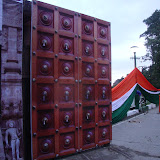Between a quarter to five and five thirty in the morning, hundreds of cell-phone alarms go off. Somewhere near Happy Valley grounds, a shrill whistle sounds repeatedly. Along corridors, doorbells ring as room boys greet us with the welcome “ Chai Sir/ Chai Ma’am.”
One by one, hooded Officer Trainees file out of their rooms, down stairs and slopes, on their way to the Polo Grounds. Bells hung around the necks of cows tinkle gently in the darkness. The rhythm of sports shoes on asphalt is matched by the jangling of hostel keys in track-suit pockets. We begin to recognize one another and speak sleepily.
P.T. progresses, with exhortations from Rana Sir and Gokul Sir. Dawn breaks. On clear days we can see snow peaks in the distance. Finally, Rana Sir calls out “ Bisar – jan!!” Rows of coloured flags atop Dalai Hills flutter gently in the sunshine. It’s another new day at LBSNAA.
Rain, rain and rain. Rainwater rushing down the slopes, dripping off umbrellas, down our necks, getting in our shoes. The first month at LBSNAA, the skies were as weepy as the most homesick Probationers. Mint-fresh Probationers in Bandhgalas and starched sarees. Eating delicately and self-consciously with forks and spoons. Salt = salt + pepper. Excuse me. Please. Thank you. Ultimate Shishtachar.
We looked frantically for short-cuts to the Mess and classrooms. In a haze of confusion, we found Kendriya Bhandar and Ganga Dhaba. We discovered Mall Road with its seemingly endless possibilities, and later, Landour. We discovered one another…. and ourselves.
My tracksuit still smells of smoke from a wood-fire at Dodital. Or so it seems. It smells like the hot water our mess staff gave us on Dharwadhar. The night sky looked as though some primordial being had scraped out clumps of darkness from a carpet of brilliant stars. The ice-covered peaks of Bandarpunch and Dharwa Top surrounded us – silent sentinels blacker than the darkness. Some of us tucked torches into our monkey-caps – the only sources of light for our dinner. Mess food never tasted so good.
How we dug into our sleeping bags, shivering as the icy wind tugged at our tents! Those of us who had been drenched by hail during the climb up from Hanumanchatti, were the worst off. Not many of us slept. How hard it must be for our soldiers who spend three months at a time on Siachen at -30 degrees. I had known it for a fact, but had never felt it so acutely.
“Freshening up” was basically ‘Jhaari ke peechhey, khule aasman ke neechey.’ The ground, the shrubs were all covered in patches of snow. Far from the tents, the black ice-peaks loomed closer, witnesses to a history that I would neither know nor comprehend. Before their ominous silence, the powerful torch-beam seemed to fade. It was not the fear of ghosts, nor of bears or leopards but something else – it was not just the cold that made me shudder uncontrollably.
Hillsides red with the flowering Ramdana crop. Lovely red roses. Agora was where DIG left us. He was a black dog who accompanied us from Dharwadhar through Dodital to Agora, plodding beside us over ice, rocks and grassy bugyals.
No mobile phone towers, no television, no electricity, no running water – the best opportunity we ever had to know one another.
Evening came on peacefully beside the Bhagirathi. Lights came on in Joshyara and Uttarakashi on opposite hills. The suspension bridge connecting them swayed in the breeze.
We sat on the banks, soaking in the contrast between the wide, tranquil river and the bustling towns. The priestess of the riverside temple sang us a song, blessed us and advised us all not to have more than two children.
Jeera, turmeric, tomatoes and deghi mirch. The patented spice mixture that goes into nearly every dish – dal, sabjee, paneer or chicken – at the LBSNAA Mess. For us it is “ Ghar ka Khana”. It lures us out of Ganga, Kaveri, Narmada and Happy Valley , along a mini-trek . The Mess throbs with activity. Languages from Tamil to Bhutanese, Marathi to Nagamese mingle with the universal sound of laughter as nearly three hundred of us celebrate being together.
In my teens, I was fascinated by the Troubadours, bards in medieval Europe who composed romantic songs. These were sung beneath the windows of fortunate ladies at night. The bards of LBSNAA reach the peak of their creativity around one o’clock at night, with help from Ganga Top and The Tavern. Thereafter, we are treated to their musical(??) efforts. Finally, silence prevails as the last of the troubadours crawls into bed. Only the soft moonlight stays awake, treading over the faraway hills.
JOYOSHI DAS GUPTA
B 32
85TH FOUNDATION COURSE

